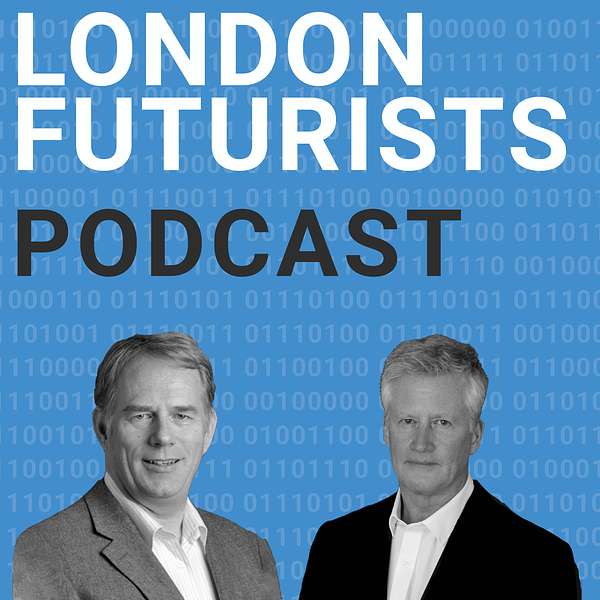
London Futurists
Anticipating and managing exponential impact - hosts David Wood and Calum Chace
Calum Chace is a sought-after keynote speaker and best-selling writer on artificial intelligence. He focuses on the medium- and long-term impact of AI on all of us, our societies and our economies. He advises companies and governments on AI policy.
His non-fiction books on AI are Surviving AI, about superintelligence, and The Economic Singularity, about the future of jobs. Both are now in their third editions.
He also wrote Pandora's Brain and Pandora’s Oracle, a pair of techno-thrillers about the first superintelligence. He is a regular contributor to magazines, newspapers, and radio.
In the last decade, Calum has given over 150 talks in 20 countries on six continents. Videos of his talks, and lots of other materials are available at https://calumchace.com/.
He is co-founder of a think tank focused on the future of jobs, called the Economic Singularity Foundation. The Foundation has published Stories from 2045, a collection of short stories written by its members.
Before becoming a full-time writer and speaker, Calum had a 30-year career in journalism and in business, as a marketer, a strategy consultant and a CEO. He studied philosophy, politics, and economics at Oxford University, which confirmed his suspicion that science fiction is actually philosophy in fancy dress.
David Wood is Chair of London Futurists, and is the author or lead editor of twelve books about the future, including The Singularity Principles, Vital Foresight, The Abolition of Aging, Smartphones and Beyond, and Sustainable Superabundance.
He is also principal of the independent futurist consultancy and publisher Delta Wisdom, executive director of the Longevity Escape Velocity (LEV) Foundation, Foresight Advisor at SingularityNET, and a board director at the IEET (Institute for Ethics and Emerging Technologies). He regularly gives keynote talks around the world on how to prepare for radical disruption. See https://deltawisdom.com/.
As a pioneer of the mobile computing and smartphone industry, he co-founded Symbian in 1998. By 2012, software written by his teams had been included as the operating system on 500 million smartphones.
From 2010 to 2013, he was Technology Planning Lead (CTO) of Accenture Mobility, where he also co-led Accenture’s Mobility Health business initiative.
Has an MA in Mathematics from Cambridge, where he also undertook doctoral research in the Philosophy of Science, and a DSc from the University of Westminster.
London Futurists
AI overview: 2. The Big Bang and the years that followed
In this episode, co-hosts Calum Chace and David Wood continue their review of progress in AI, taking up the story at the 2012 "Big Bang".
00.05: Introduction: exponential impact, big bangs, jolts, and jerks
00.45: What enabled the Big Bang
01.25: Moore's Law
02.05: Moore's Law has always evolved since its inception in 1965
03.08: Intel's tick tock becomes tic tac toe
03.49: GPUs - Graphic Processing Units
04.29: TPUs - Tensor Processing Units
04.46: Moore's Law is not dead or dying
05.10: 3D chips
05.32: Memristors
05.54: Neuromorphic chips
06.48: Quantum computing
08.18: The astonishing effect of exponential growth
09.08: We have seen this effect in computing already. The cost of an iPhone in the 1950s.
09.42: Exponential growth can't continue forever, but Moore's Law hasn't reached any theoretical limits
10.33: Reasons why Moore's Law might end: too small, too expensive, not worthwhile
11.20: Counter-arguments
12.01: "Plenty more room at the bottom"
12.56: Software and algorithms can help keep Moore's Law going
14.15: Using AI to improve chip design
14.40: Data is critical
15.00: ImageNet, Fei Fei Lee, Amazon Turk
16.10: AIs labelling data
16.35: The Big Bang
17.00: Jürgen Schmidhuber challenges the narrative
17.41: The Big Bang enabled AI to make money
18.24: 2015 and the Great Robot Freak-Out
18.43: Progress in many domains, especially natural language processing
19.44: Machine Learning and Deep Learning
20.25: Boiling the ocean vs the scientific method's hypothesis-driven approach
21.15: Deep Learning: levels
21.57: How Deep Learning systems recognise faces
22.48: Supervised, Unsupervised, and Reinforcement Learning
24.00: Variants, including Deep Reinforcement Learning and Self-Supervised Learning
24.30: Yann LeCun's camera metaphor for Deep Learning
26.05: Lack of transparency is a concern
27.45: Explainable AI. Is it achievable?
29.00: Other AI problems
29.17: Has another Big Bang taken place? Large Language Models like GPT-3
30.08: Few-shot learning and transfer learning
30.40: Escaping Uncanny Valley
31.50: Gato and partially general AI
Music: Spike Protein, by Koi Discovery, available under CC0 1.0 Public Domain Declaration
For more about the podcast hosts, see https://calumchace.com/ and https://dw2blog.com/
Elevate how you lead with insight from today’s most influential executives.
Listen on: Apple Podcasts Spotify

